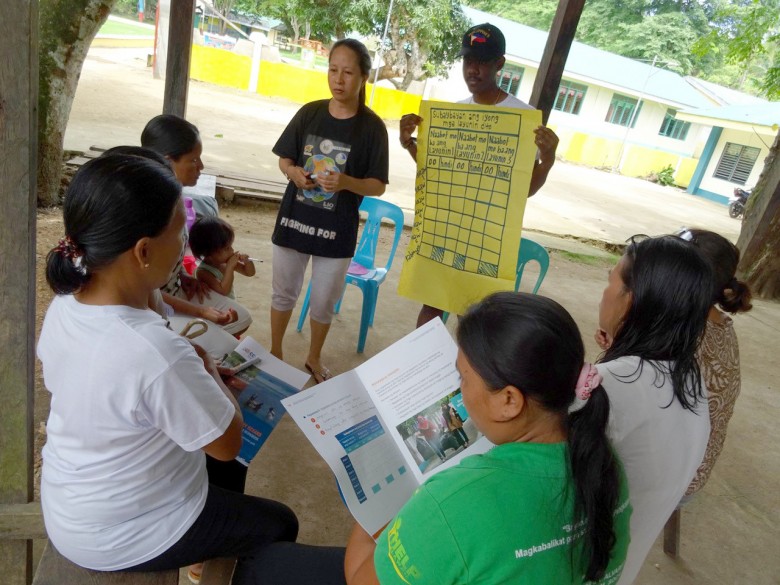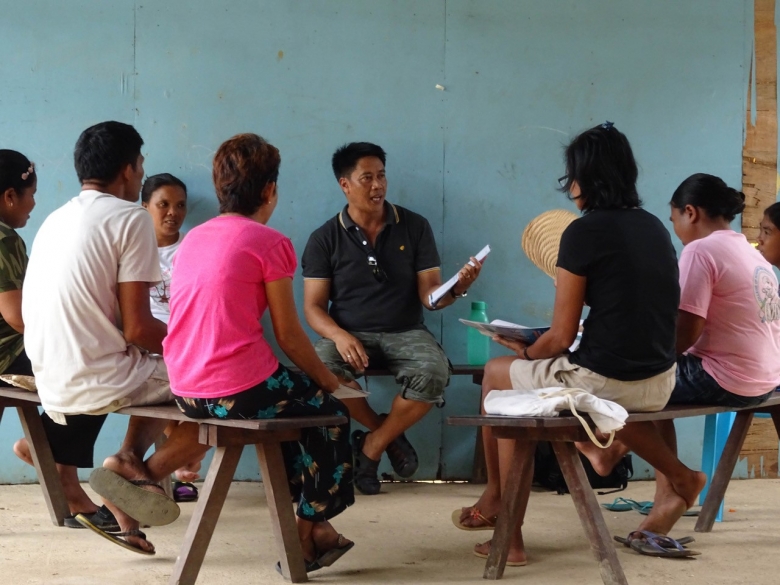
My Future, My Oceans is rolled out at Bebeladan village, El Nido, the Philippines (Photo: P Bradley)
My Future, My Oceans comes to El Nido
June 14 2018
The low-cost CCRES behaviour change tool, My Future, My Oceans, is being piloted at El Nido in the province of Palawan, in the Philippines, in partnership with Ten Knots Development Corporation, this month.
The trial seeks to validate use of the tool outside of Indonesia where it has been used to improve waste management in a village on Selayar, the CCRES pilot site.
In the Philippines, the main behaviour targeted is plastic collection. Almost 100 women from two villages are involved. The activity is being led by My Future, My Oceans leader Erik Simmons, from The University of Queensland (UQ), in collaboration with Mariglo Laririt, Head of Environmental and Sustainability Initiatives, at El Nido Resorts, part of Ten Knots.
At El Nido, the core psychological competencies and behaviours targeted are plastic collection; problem solving skills; checking whether the fish participants consume are caught safely or by destructive methods; perceived responsibility for the state of the environment; satisfaction with life; and perceived impact of actions on the environment.
Enhancing the philanthropic research and community facilitation skills of local personnel, including barangay leaders, government officials and staff members from Ten Knots, as well as a group of students from Georgetown University, Washington DC, attending a Ten Knots summer internship program, is one of the objectives of this El Nido partnership.
Says Ms Laririt, who is a member of the CCRES Technical Steering Committee: “This activity is providing unique opportunities for our interns to gain applied philanthropic research experience first-hand. They will assist with data collection, community outreach, and logistical support.” They will also be trained to use the My Future, My Oceans tool.

My Future, My Oceans is rolled out at Bebeladan village, El Nido, the Philippines (Photo: P Bradley)
Says Mr Simmons, a PhD student with the Triple P Innovation Precinct at UQ: “We will be measuring outcomes at three points: directly prior to implementation, directly after, and two months after the program. The results will be reported to all involved parties and the outcomes in the Philippines will be compared to the results from our work in Indonesia.”
In Indonesia, the shifts in human psychology and behaviour triggered by the program were sustained four months after the program began.
Not only were the women participants continuing to collect plastic – the primary behaviour targeted – they were are making other positive changes to how they live their lives. These included convincing their fishermen husbands to collect marine plastic, managing roaming goats (and thus their excrement) and collectively getting centralised electricity.
My Future, My Oceans is a tool for local governments and NGOs to use to promote positive behaviours, including waste management, fishing practices and personal hygiene, in coastal communities. The cost to roll-out My Future, My Oceans in a coastal community in low-resource settings is approximately AUD$2,700 covering most materials and personnel.
My Future, My Oceans is effective, easily able to be generalised, and low-cost. This ensures that non-experts – supported with light-touch training and modest investment – are capable of delivering the program,” says Mr Simmons.
“It’s been created to promote human behaviours that protect coastal ecosystems and the services they provide to local communities.”
For more information contact Erik Simmons




